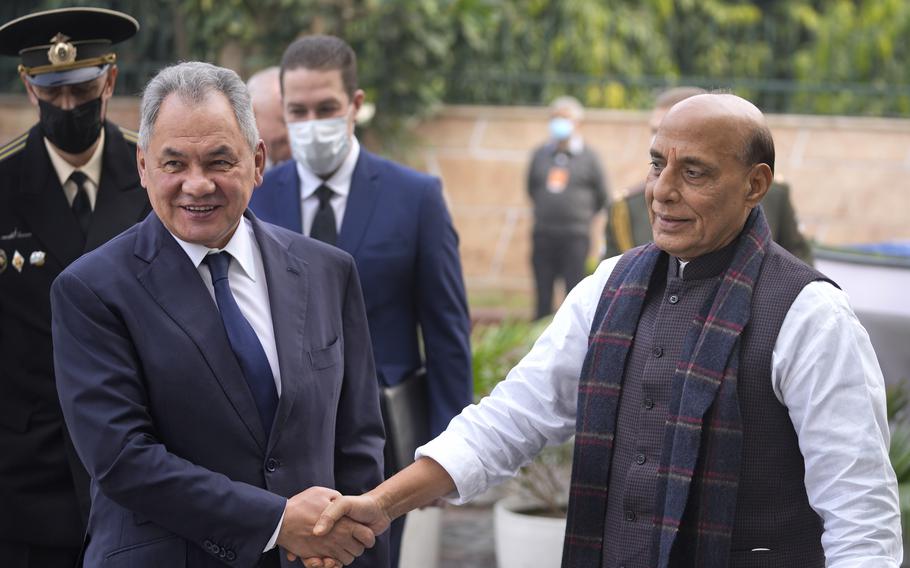
Indian Defence Minister Rajnath Singh, right, shakes hand with his Russian counterpart Sergey Shoygu in New Delhi, India, Monday, Dec. 6, 2021. House lawmakers on Wednesday, March 9, 2022, questioned India’s readiness to partner with the U.S. against China due to its longstanding ties with Russia. (Manish Swarup/AP Photo)
WASHINGTON — As the U.S. works to deepen relationships in the Indo-Pacific region, some House lawmakers on Wednesday questioned India’s readiness to partner with the U.S. against China due to its longstanding ties with Russia.
India’s decision to abstain from last week’s vote at the U.N. on a resolution condemning Russia’s invasion of Ukraine worried some lawmakers who said the U.S. will need to foster strong cooperation with India and other countries in the region to counter a rapidly modernizing Chinese military.
“It’s shocking that such a great country has abstained on the issue of the mass murder in Ukraine,” said Rep. Joe Wilson, R-S.C. “It just seems so unnatural. The relationship with the Prime Minister Narendra Modi should be with the United States, not in any way associated with the megalomaniac [Russian President Vladimir] Putin.”
Britain’s foreign minister Liz Truss linked India’s abstention in the U.N. to its economic and security dependence on Russia, which has long supplied India with the majority of its weapons, according to a Reuters report.
A Pentagon official testifying before the House Armed Services Committee on Tuesday assured lawmakers that India is diversifying its arms purchases away from Russia and is “moving in the right direction.”
“From the U.S. perspective, India is absolutely an essential partner,” said Ely Ratner, assistant secretary of defense for Indo-Pacific security affairs.
India's "complicated history and relationship" with Russia poses challenges, he said, but "they are manageable.”
Rep. Ro Khanna, D-Calif., urged U.S. commanders and the Defense Department to make clear to India that the U.S. would be a better ally than Russia against Chinese aggression. When skirmishes broke out in 2020 at the Line of Actual Control, a demarcation line that separates Indian-controlled territory from Chinese-controlled territory, the U.S. provided intelligence and other support to India, according to Ratner.
“As an Indian-American, I’m perplexed why India is unwilling to condemn Putin’s unprovoked aggression into Ukraine,” Khanna said. “We really need to press India not to be as dependent on Russian defense and to be willing to condemn Putin's aggression in Ukraine, just like we would condemn Chinese aggression beyond the Line of Control.”
As the world’s largest democracy, India is one of the most important strategic relationships for the U.S. in its quest to meet China’s rising power and counter North Korea’s missile development, Ratner said. The U.S. began fostering maritime ties with India after the Indian Ocean tsunami in 2004 and later formed an informal Indo-Pacific security group with India, Australia and Japan called the Quad.
Two U.S. commanders, Army Gen. Paul LaCamera and Adm. John Aquilino, testified Wednesday about the value of the group along with other partnerships that are bolstering U.S. security interests in the region.
The historical military alliance between the U.S. and South Korea remains a “lynchpin of regional stability” but there is concern that South Korea’s significant economic association with China could eventually drive a wedge between Seoul and Washington, LaCamera, commander of United Nations Command, Combined Forces Command and U.S. Forces Korea, told lawmakers during the hearing.
To strengthen ties with India and South Korea, the U.S. is providing space, cybersecurity and intelligence assistance to India and helping South Korea’s military with additional training, LaCamera said. The U.S. is also looking to enhance its relationships with the Philippines, Thailand and Vietnam, said Aquilino, commander of the U.S. Indo-Pacific Command.
Much of the evolving U.S. partnerships are concentrated on improving cybersecurity and establishing secure lines of communication, Ratner said. China’s penetration of networks in the region is “quite severe,” he said.
Rep. Seth Moulton, D-Mass., cautioned Pentagon officials on Wednesday that Chinese investments in artificial intelligence, quantum computing, drones and other technology could soon outmatch the capabilities of the U.S. military.
“This is the fight of the future,” he said.
The commanders on Wednesday acknowledged the Pentagon “absolutely needs to move faster” on innovation and advanced technology. Aquilino said he wants to see better integrated radar imaging systems for ballistic missile defense and asked lawmakers to support a defense system on Guam for hypersonic weapons and other threats.
“Guam’s strategic importance is difficult to overstate,” Aquilino said. “The area in the Indo-Pacific is expansive, half the globe and lot of it water. To be able to posture forces in places that matter, we have focused on Guam as a strategic hub.”
The Defense Department is also focusing on providing defense capabilities to Taiwan, a self-governing island that Beijing claims as its own, Ratner said.
Lawmakers drew comparisons between China’s ambitions to retake Taiwan and Russia’s invasion of Ukraine, a fellow former Soviet republic.
“We can easily see the China-Taiwan situation in the same way we now see the Russia-Ukraine situation,” said Rep. Adam Smith, D-Wash., chairman of the committee. “We need to constantly remind China that that is not the way global powers are supposed to behave … Having a robust U.S. presence in the region lets China know that that is not an acceptable or doable option.”